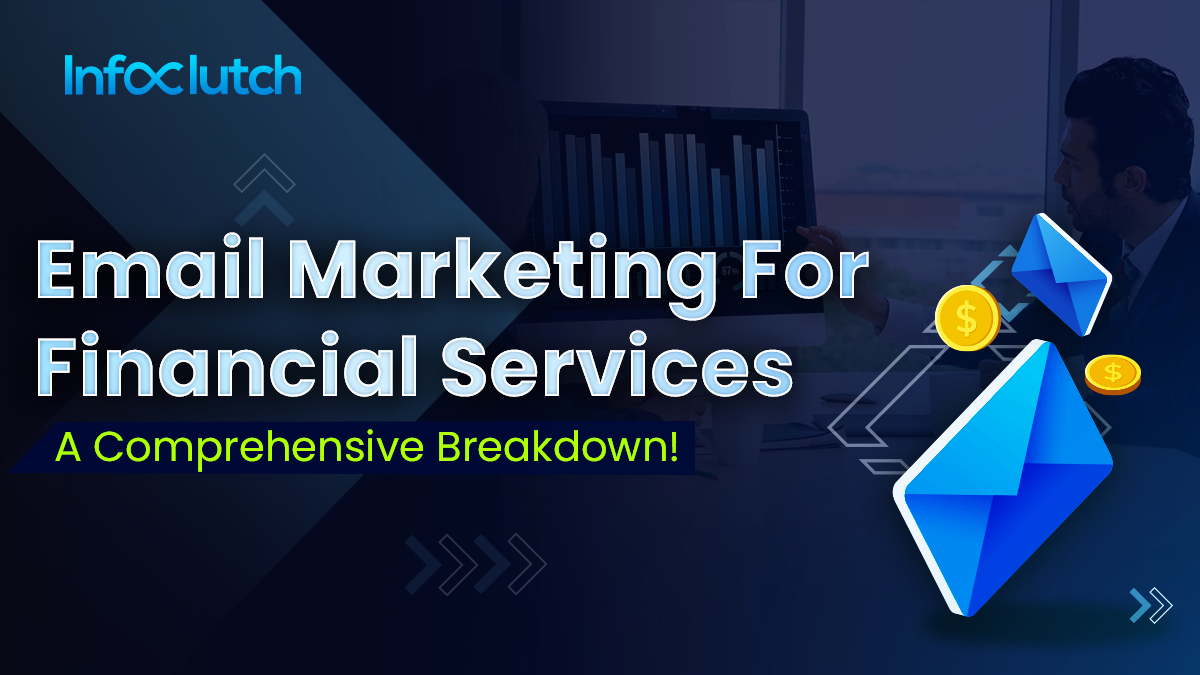Many Marketers must be aware that there are 4 billion daily email users, which is expected to grow to 4.6 billion. These promising numbers prove that email marketing for financial companies can succeed immensely. At the same time, reaching your audience with little money spent on ads is a feasible, cost-effective strategy. That’s why email marketing adds value and trust and builds authority.
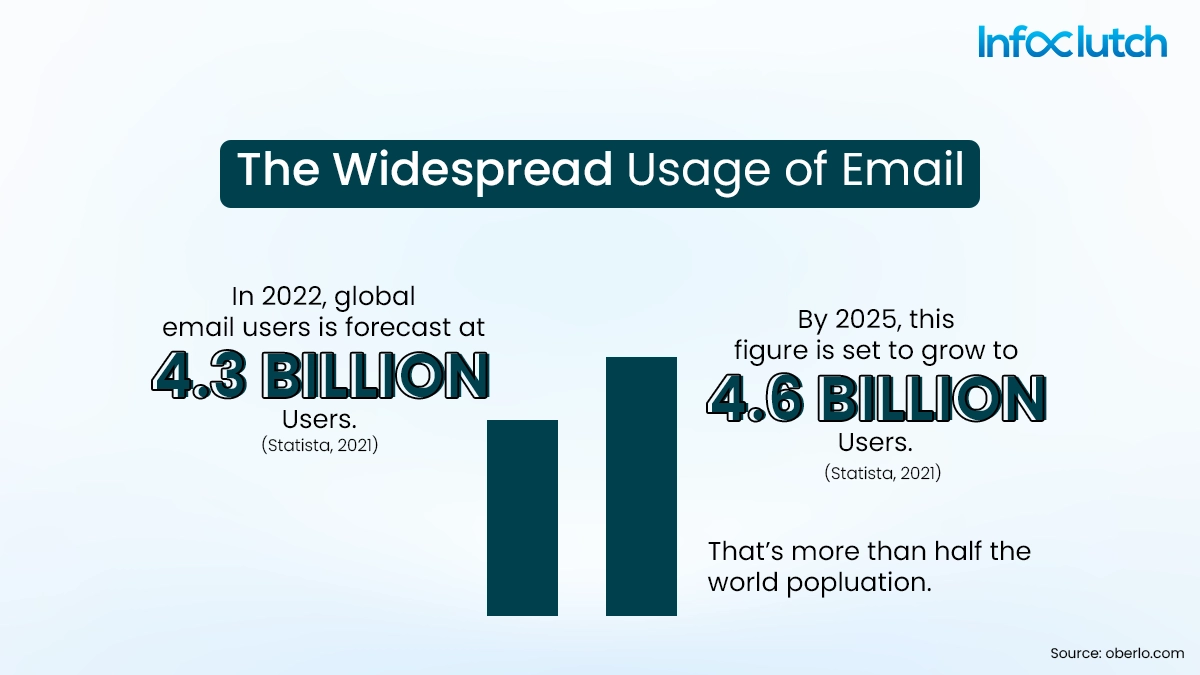
Fintech companies are shaking up their marketing strategies through rapid innovative collaborations. For the same reason, financial services providers must stay at the top of the email game and communication to keep up with this sheer force of competition.
In today’s digital era, email marketing has emerged as a potent tool for businesses across all industries, including the financial services sector. With the power to reach a vast audience in a cost-effective manner, email marketing enables financial institutions to build meaningful relationships, boost customer engagement, and drive revenue growth. This article will delve into the strategies, benefits, and statistics surrounding email marketing for financial services, highlighting its significance as a valuable marketing channel.
The Power of Personalization in Email Marketing
Personalization is the driving factor for performance and better outcomes. Here are two ways to achieve the best out of personalization for email marketing for financial services.
Tailoring Content for Targeted Audiences
Personalized emails lies at the core of successful email marketing for financial services. By leveraging customer data and segmentation, financial institutions can create targeted content that speaks directly to the unique needs and preferences of specific customer groups. This tailored approach enhances customer experience, increases open rates, and fosters brand loyalty. This can be harnessed with the technique of obtaining the email marketing list which has direct co-relation of delivering the desired information to the targeted audience.
Utilizing Behavioral Data
Financial institutions can utilize behavioral data, such as transaction history, website interactions, and customer preferences, to craft highly relevant email campaigns. By understanding customer behaviors and preferences, marketers can deliver personalized offers, investment recommendations, and financial advice, leading to improved engagement and conversions.
Email Marketing in Financial Services: Statistics and Trends
The primary user acquisition channel is email for 81% of businesses. Email is also beneficial for 80% of retention, making it vital to focus on statistics and trends of email marketing for financial services.
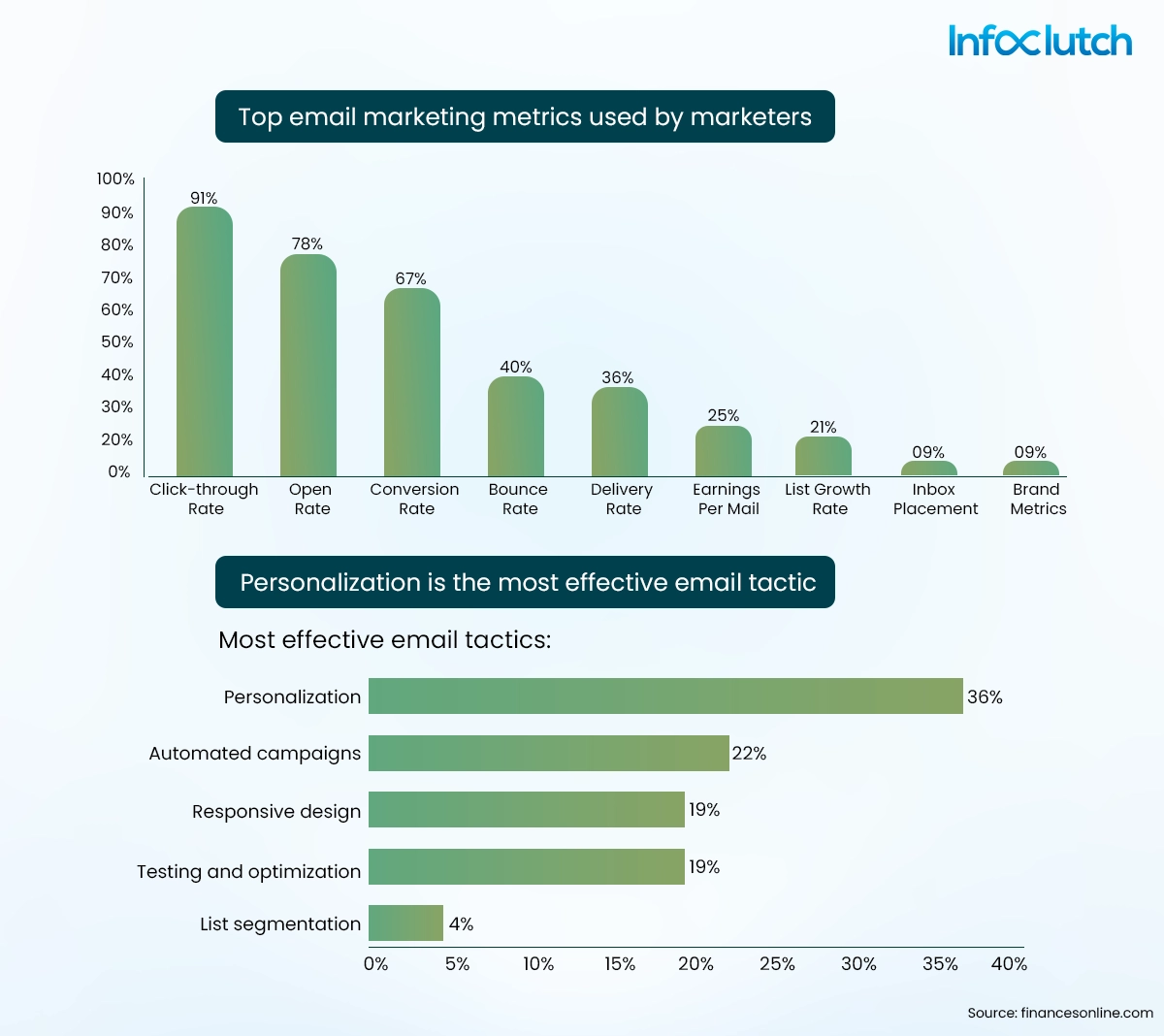
The Rise of Mobile Email Users
Statistics show that a significant portion of email recipients access their emails on mobile devices. In the financial services sector, where timely communication is crucial, optimizing emails for mobile responsiveness is essential. According to a recent study, mobile opens accounted for over 60% of all email opens in the finance industry.
Error-free Emails
Always check and address vital issues before you click “send” to ascertain quality and accuracy with all emails from a financial organization. Powerful pre-send checklists should be in order, and testing tools must be utilized to identify broken links, formatting, and other issues impacting performance. Analyze links, subject lines, and check your code for critical tags before the email reaches the recipient’s inbox.
Conversion Rates and ROI
Email marketing consistently delivers a higher return on investment (ROI) compared to other marketing channels. In financial services, personalized and targeted email campaigns have been shown to generate conversion rates that outperform general marketing emails significantly.
Automating Customer Journeys
Automation has revolutionized email marketing for financial institutions. By implementing automated workflows, financial marketers can nurture leads, onboard new customers, and provide timely updates, streamlining the customer journey and enhancing customer satisfaction.
Best Practices for Email Marketing in Financial Services
Here are some of the most implemented best practices of email marketing in financial services that one must take advantage of.
Compliance and Data Security
Compliance with industry regulations and data security are of paramount importance. Ensuring that all email marketing campaigns adhere to relevant laws and security standards builds trust with customers and safeguards sensitive financial information.
A/B Testing for Optimization
A/B testing different elements of email campaigns, such as subject lines, CTAs, and content, allows financial marketers to identify the most effective strategies and optimize future campaigns for better results.
Striking Advantages of Email Marketing for Financial Services:
Email marketing is essential for financial services for several compelling reasons. As the digital landscape continues to evolve, financial institutions face intense competition to attract and retain customers. In this dynamic environment, email marketing proves to be a powerful and cost-effective tool for fostering customer relationships, increasing engagement, and driving business growth. Let’s explore the key reasons why email marketing is crucial for financial services:
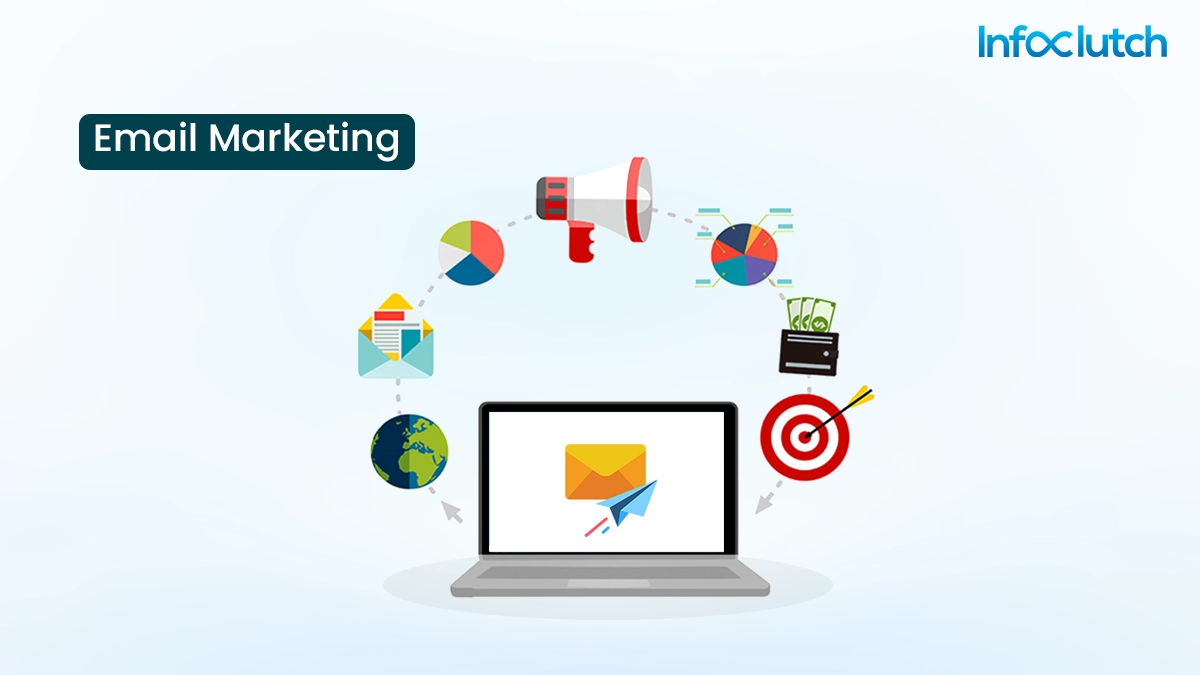
- Cost-Effectiveness: Compared to traditional marketing channels like print media or direct mail, email marketing offers a cost-effective solution for financial institutions. Sending bulk emails incurs minimal expenses, making it an attractive option for organizations with varying marketing budgets. Additionally, email automation enables marketers to save time and resources by setting up scheduled campaigns and triggered emails based on specific customer actions.
- Impressive Campaigns: Email marketing consistently delivers a higher return on investment compared to other marketing channels. Financial services organizations can use email campaigns to promote products, services, and special offers, resulting in increased lead generation and improved conversion rates. When coupled with personalized content and targeted offers, email campaigns have the potential to yield impressive results.
- Consequential conversation with customer service: Email marketing allows financial services providers to engage their audience in a two-way communication channel. Customers can respond to emails, provide feedback, or seek assistance, creating opportunities for meaningful interactions. Timely responses to customer inquiries demonstrate a commitment to excellent customer service, further strengthening the bond between the customer and the financial institution.
- Relating to Prospective client’s interest: With email marketing, financial organizations can segment their customer base into distinct groups based on specific criteria, such as age, income level, investment preferences, or life stage. This segmentation enables marketers to tailor content and offers to suit the unique needs and interests of each group, increasing the relevance of the messages delivered.
- Data Privacy: In the financial services industry, adhering to regulatory compliance and ensuring data security are critical priorities. Email marketing platforms often have robust security measures in place, ensuring that sensitive customer information remains protected. Additionally, complying with email marketing regulations helps build trust with customers, showcasing the institution’s commitment to ethical practices.
- Measurable Performance Metrics: Email marketing provides financial marketers with valuable performance metrics that offer insights into the effectiveness of their campaigns. Metrics such as open rates, click-through rates, and conversion rates allow organizations to measure the success of their email efforts and make data-driven improvements to future campaigns.
Setting up an email marketing strategy is crucial for B2B (Business-to-Business) financial services for several compelling reasons:

In the B2B environment, the sales cycle is often longer and involves multiple decision-makers. Email marketing allows financial services providers to nurture leads over time, providing valuable content and insights to educate potential clients and build trust. By staying top-of-mind through regular communication, financial institutions can increase the likelihood of converting leads into loyal customers. Email marketing provides a direct and personalized communication channel to connect with key decision-makers and stakeholders. Through informative content and thought leadership, financial institutions can position themselves as experts in their field, fostering credibility and long-term partnerships.
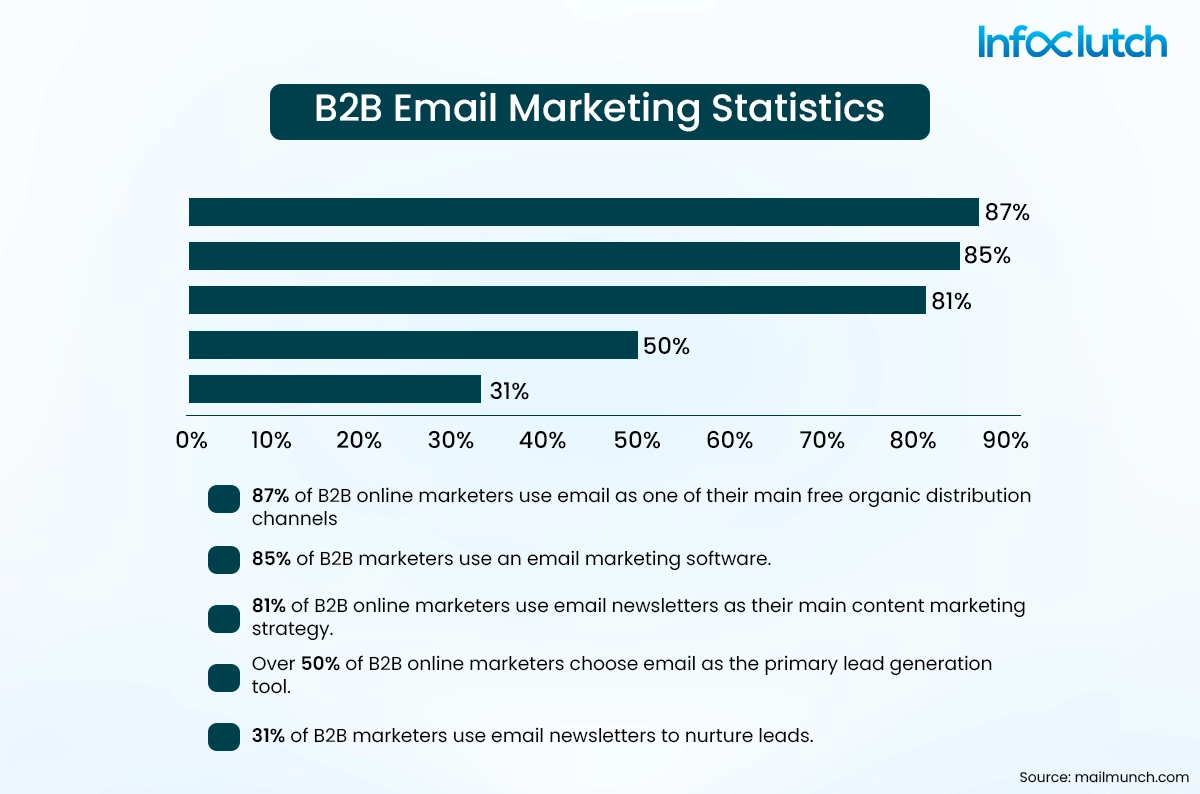
Demonstrating Expertise: Email marketing allows B2B financial services to showcase their expertise in the industry. By sharing relevant and valuable content, such as market insights, regulatory updates, and financial advice, financial institutions can establish themselves as a reliable source of information and solutions for their clients’ business challenges.
Targeting Specific Segments: B2B financial services often have a diverse client base with varying needs and preferences. With email marketing, financial institutions can segment their audience based on factors like industry, company size, location, or past interactions. Targeted emails ensure that recipients receive content that is relevant to their specific needs, increasing the chances of engagement and conversion.
Drip Campaigns: Email marketing allows B2B financial services to implement drip campaigns. These automated workflows deliver a series of emails to prospects at strategic intervals, guiding them through the sales funnel. By providing relevant content at each stage of the buyer’s journey, financial institutions can move prospects closer to making a purchase decision.
Budget Planning: B2B financial services often have marketing budgets that need to be utilized wisely. Email marketing offers a cost-effective solution compared to traditional marketing channels. It requires minimal expenses to reach a large audience and can deliver significant returns on investment when executed effectively.
Measurable Results: Email marketing platforms provide comprehensive analytics that allow financial institutions to measure the performance of their email campaigns. Metrics such as open rates, click-through rates, and conversion rates offer valuable insights into the effectiveness of the strategy. These data-driven insights enable financial institutions to refine their campaigns for better results continually.
Upselling and Cross-Selling Opportunities: Existing clients are a valuable source of revenue for B2B financial services. Email marketing can be used to upsell or cross-sell additional products or services to current clients. By identifying their needs and pain points, financial institutions can offer targeted solutions, leading to increased customer loyalty and revenue growth.
Timely Communication: In the fast-paced B2B environment, timely communication is essential. Email marketing allows financial institutions to deliver time-sensitive information, such as market updates, new product launches, or regulatory changes, promptly to their clients. This proactive approach enhances customer satisfaction and strengthens relationships.
An email marketing strategy is a valuable tool for B2B financial services to nurture leads, build relationships, demonstrate expertise, target specific segments, and drive revenue growth. By leveraging the power of personalized communication and automated workflows, financial institutions can effectively engage with their audience, stay competitive, and achieve their business objectives in the ever-evolving B2B landscape.
Conclusion
Email marketing plays a pivotal role in the success of financial services organizations. For leveraging direct communication, personalization, cost-effectiveness, and customer engagement, financial institutions must buy meticulously curated Business email databases that can express the power of email marketing in the best possible way.
Valuable data will help the financial organization build a better relationships, drive conversions and remain competitive in an increasingly digital world. Embracing email marketing as an integral part of their marketing strategy enables financial organizations to stay connected with their audience, provide valuable information, and ultimately achieve their business objectives.

